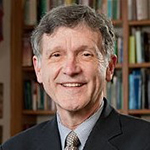By Bill Leonard
 “Is not this the fast that I choose: to loose the bonds of injustice, to undo the thongs of the yoke, to let the oppressed go free, and to break every yoke? Is it not to share your bread with the hungry, and bring the homeless poor into your house; when you see the naked, to cover them … ? … and you shall be like a watered garden, like a spring of water, whose waters never fail. … you shall be called the repairer of the breach, the restorer of streets to live in.”
“Is not this the fast that I choose: to loose the bonds of injustice, to undo the thongs of the yoke, to let the oppressed go free, and to break every yoke? Is it not to share your bread with the hungry, and bring the homeless poor into your house; when you see the naked, to cover them … ? … and you shall be like a watered garden, like a spring of water, whose waters never fail. … you shall be called the repairer of the breach, the restorer of streets to live in.”
Last week I spoke at two different but parallel occasions: a celebration of “faith-based partners” engaged for 50 years with the Forsyth County (N.C.) Experiment in Self-Reliance (ESR); and the annual graduation “hooding” ceremony for master of divinity students at the School of Divinity at Wake Forest University (WFUSD). The assigned hooding text came from Isaiah 58 and brought both events together, a powerful statement of hope and promise amid a calling to address present realities.
Isaiah begins with calling: “Is not this the fast I choose?” Both ESR and WFUSD are grounded in “callings” bound up in education and communal action. ESR is a community organization that “helps ‘working low-income’ and ‘chronically homeless’ individuals and families, who are ready to help themselves achieve their full potential in developing economic literacy, obtaining education and housing.” WFUSD offers a three-year curriculum in theological education, not only to provide academic preparation for Christian ministry, but to engage students as “agents of justice, reconciliation and compassion” in church and society.
Divinity School callings often begin with hesitancy, even mystery, like that described by Jerena Lee in her 1836 journal, A coloured Lady, giving an account of her call to Preach the Gospel. She wrote:
After my sanctification … to my utter surprise there seemed to sound a voice which I thought I distinctly heard, and most certainly understood, which said to me, ‘Go preach the Gospel!’ I immediately replied aloud, “No one will believe me.” Again … the same voice seemed to say, ‘Preach the Gospel; I will put words in your mouth, and … turn your enemies to … friends.”
“Callings” send folks to divinity school, even when it seems, “no one will believe me.” Amid term papers, examinations, and internships, they often discover that certain ideological “enemies” become real friends: gays and straights; blacks and whites; Publicans and Re-publicans, Pentecostals and Calvinists experience dialogue and perhaps friendship. ESR brings together religious persons of varying and contradictory doctrines, responding together to poverty and homelessness, even as politicians attack programs as “underfunded” or “poorly administered.” Seminary students research and reflect, often overtaken by the radical gospel of Jesus, as William James says, “not as a dull habit, but as an acute fever.”
Isaiah chapter 58 charts that fevered calling, promising: “You shall be like a watered garden,” but warning one must first choose “the fast,” by breaking bonds of injustice, and “letting the oppressed go free.”
In The Future of Faith, Harvey Cox says “this utopian hope, even when modestly expressed links Jesus and the prophets to a much wider history of human longing. … the antidote to fatalism and the corrosive fear that there are no alternatives to any status quo” of continuing poverty, hunger, and oppression. Yet the hungry, homeless poor, or oppressed are not a mere sociological subgroup, pathetic underclass, or romanticized “needy.” They are human beings, many of whom are themselves “watered gardens” of grace guidance.
Catholic Worker founder Dorothy Day tells of her first engagement with “the poor” as a wartime nurse, personified in a 94-year-old woman who rejected Day’s efforts at bathing her, fighting tooth and nail. “Let us help you,” a nurse cried. “Can’t you see that we want to take care of you because we love you?” “Love be damned,” the woman replied, “I want my wig.” Day comments insightfully that the wigless woman “needed more than to be loved. She wanted to be respected as a person.”
Amid all our callings, we learn that hurting, quirky people aren’t simply gospel fodder or sentimentalized “disadvantaged.” They are imago dei, with their own stories and hopes, given to mostly unoriginal sins. “Sustaining the life of the destitute” requires seeing beyond their destitution.
And where do ESR and ministerial graduates belong? In the streets of course, carrying grace into the “parched places.” In Stride Toward Freedom Martin Luther King Jr. wrote timelessly: “A solution of the present crisis will not take place unless men and women work for it. Human progress is neither automatic nor inevitable. … Every step toward the goal of justice requires sacrifice, suffering, and struggle; the tireless exertions and passionate concern of dedicated individuals.”
King wrote that fresh from the streets of Montgomery, Ala., across the Edmund Pettis Bridge in Selma, a dangerous battle ground that became sacred space 50 years later. Walter Brueggemann suggests a prophetic link between the word and action, “a response informed by the bodily reality of brokenness so evident on the street.”
Taking the gospel into the streets may bring rapid transformation, but often healing is a long time coming. Yet if there is even a chance that some of the brokenness on even a few streets in Winston-Salem, Baltimore, Boston or Baghdad can be repaired, then surely it’s worth the calling and the risk, now and forevermore.
